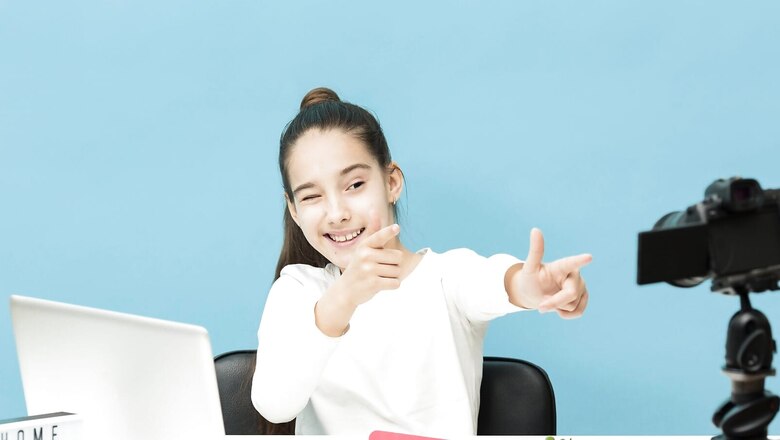
views
Have you ever thought about the darker side of scrolling on the screens for hours and hours, hooked to pictures and videos and manipulating your mind to ignore issues around you?
Recently, public schools in Seattle filed a lawsuit against social media companies such as TikTok, Instagram, Snapchat, and Facebook in a federal district court, alleging that harmful content online is impacting the mental health of children and that these social media companies are allowing it to happen. This development has brought attention to the issue of how social media platforms are affecting the wellbeing and mental health of children. Let’s understand the impact of social media on children’s mental health and what steps parents, guardians, and teachers can take to reduce this impact.
Prakriti Poddar, Global Head, Mental Health and Wellbeing, RoundGlass, says, “Social media like any technology is undeniably useful when used in moderation and responsibly. But in the hands of adolescents, social media often ends up getting overused as they don’t know where to draw a line. Their brains are still developing and prone to indulging in risky behaviours.”
Effects of excessive use of social media
From the age of 10, children’s brains undergo a fundamental shift that spurs them to seek social rewards, including attention and approval from their peers. And social media becomes a handy tool for getting such instant validation. However, when they don’t get this validation, they feel let down. This leads to body image issues, impacts their self-esteem, causes stress and anxiety and may trigger children with existing mental health issues. Spending too much time on social media also exposes children to the risk of cyberbullying, paedophiles, and pornography.
Also Read: Sushi Can Be Enjoyed In Jain, Vegetarian, And Vegan Options Too: Harry Hakuei Kosato
“Overuse of social media platforms has exposed a lot of people to body image issues, cyberbullying, tech addiction and much more. Personalised features and fake account names give no access to the elders to know what their kids are posting or watching on these platforms. They have no clue about their mental condition and assume that children are safe on social media. Constant use of social media is directly linked to mental health,” opines Dr Preeti Singh, Clinical Psychology, Paras Hospitals, Gurugram.
Experts have also stated that overstimulation of social networking sites disrupts the nervous system. Hence, these people have more chances of catching disorders like ADHD, depression, oppositional defiant disorder, and even anxiety.
To avoid such situations, parents need to take a step ahead. They will need to watch and learn how to limit social media and total screen time with their children from a young age. “Parental controls must be used until parents are confident that their child is old enough to manage their own accounts. Though it is difficult to completely cut off the young generation from social media, parents must impose boundaries on their use. Mealtimes are ideal for putting phones aside. Another good practice is to designate a time each night when you will turn off all screens to give yourself ample time to unwind and prepare your body for sleep,” says Dr. C.P. Singh,Pediatrician & Neonatologist, Regency Health. Encourage face-to-face contact with friends. This is especially crucial for teenagers who are prone to social anxiety disorder. “Engaging your children in extracurricular activities like singing, dancing, and some sports activities will also help in limiting screen time as well as social media platforms,” adds Singh.
Ways to deal with social media
Poddar feels as adults in their lives, parents, guardians, and teachers can help teenagers moderate their use of social media and help them cope with its impact by adopting the following practices:
- Be Mindfully Present and Available: First and the most important thing is to let them know that you are there for them no matter what. Let your child know that he or she can reach out to you for help and that you are mindful of what they are telling you.
- Lead by Example: Be the change that you want to see in your child. For example, put away your phone during mealtimes, and tell your child how you are limiting your screen time. Your responsible behaviour is bound to rub off on your child too and help him/her develop a healthier relationship with social media.
- Limit Social Media Use: Put in place social media use timings and motivate your teen to follow them. They might initially resist but stick to your ground and make them realize how this will help them in the long run.
- Talk About Social Media: Ask your teen why he or she uses social media and how it makes him/her feel – happy or anxious? Educate your teen about social media and make her understand that what she posts there can have repercussions in real life.
- Follow Social Media Guidelines: Many portals have an age cut-off to set up an account. Follow these rules and explain to your child why these rules are important.
Social media can help adolescents feel more connected to their peers but not at the cost of their wellbeing. There’s a thin line between healthy social media use and overuse, and as adults, you need to make your children aware of that distinction to help him/her be on the right side of technology.
Read all the Latest Lifestyle News here














Comments
0 comment